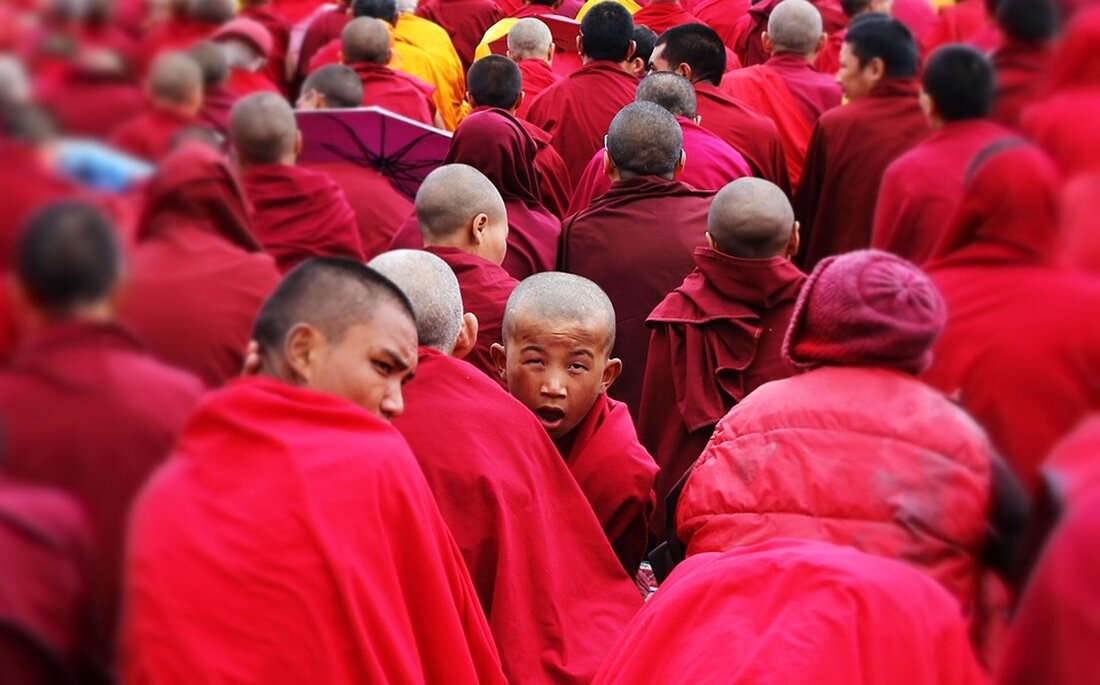Dalai Lama promises not to be the last leader of Tibetan Buddhism
Dalai Lama promises not to be the last leader of Tibetan Buddhism
dharamshala, India/Hong Kong - the Dalai Lama has announced that he will have a successor after his death. In doing so, he continues a centuries -old tradition that has become a dispute in the conflict with the China Communist Party about the future of Tibet.
announcement in Dharamshala
The spiritual leader of Tibetan Buddhism gave this explanation on Wednesday in a video message to religious oldest, which had gathered in Dharamshala, India. The Nobel Peace Prize winner has lived there since his escape from Tibet after a failed uprising against the Chinese communist rule in 1959.
continued the Dalai Lama Office
"I confirm that the institution of the Dalai Lama will continue," said the Dalai Lama in the video previously recorded and referred to the requests that he has received over the years of Tibetan and Tibetan Buddhists. "The Gaden Phodrang Trust has sole authority to recognize the future rebirth; no one else has the right to interfere in this matter," he added.
processes of successor searches
The office should carry out the procedures for searching and recognizing the future Dalai Lama "according to the tradition of the past", according to the Dalai Lama, without revealing any further details about the process. The Dalai Lama had previously stated that he would consult the high -ranking lamas of Tibetan Buddhism and the Tibetan audience at about 90 years in order to re -evaluate whether the institution of the Dalai Lama should be continued.
conflict with the Chinese government
The announcement on Wednesday - just a few days before his 90th birthday on this Sunday - prepares the soil for a huge struggle for its successor, between Tibetan leaders in exile and the atheistic communist party of China, which only insists to have the authority to approve the next Dalai Lama.
In a statement on the statements of the Dalai Lama, a spokesman for the Chinese Ministry of Foreign Affairs confirmed that Beijing's long -term position must correspond to the laws and regulations of China. The search and identification must take place in China and approved by the central government.
succession and the influence of China's
in a memoir published in March, the Dalai Lama said that his successor in the "free world" would be born outside of China and asked his supporters to reject any candidate selected by Beijing. This could lead to the creation of two rival Dalai Lamas: one who was appointed by his predecessor and one who was selected by the China Communist Party.
"Both the Tibetan exile community and the Chinese government want to influence the future of Tibet, and they see the next Dalai Lama as a key," said Ruth Gamble, expert in Tibetan history at La Trobe University in Melbourne, Australia
The concern for the Tibetan identity
Samdhong Rinpoche, a high -ranking civil servant in the Dalai Lama office, informed the journalist on Wednesday that further information about the procedures or methods of rebirth of the Dalai Lama will not be announced to the public until successor.
across his life in exile, the 14th Dalai Lama, Tenzin Gyatso, has become a symbol of Tibet and his striving for real autonomy under the increasingly strict grip on Beijings over the Himalayan region. The spiritual leader Tibetans in the home country and in exile and lifted their fate onto the global stage of the home town of Dharamshala, where he established an exile government.
Influence of the rebirth tradition
The Dalai Lama has spoken out for the fact that he no longer strives for full independence for Tibet, but "significant" autonomy, which would enable Tibetans to preserve their unique culture, religion and identity. His commitment to the non-violent “middle path” policy brought him international support and the Nobel Peace Prize in 1989.
The Dalai Lama has long said about Beijing's efforts to intervene in the rebirth system of Tibetan Buddhism. Tibetan Buddhists believe in the cycle of rebirth and that an enlightened spiritual master like the Dalai Lama is able to choose the place and the time of its rebirth by sympathy and prayer.
political instrumentalization of religion
Religious tradition has increasingly become a battlefield for control over the Tibetan hearts and thoughts, especially since the controversial rebirth of Panchen Lama, the second highest figure in religion. In 1995 Beijing installed his own Panchen Lama in response to the choice of Dalai Lama, whose candidate - a six -year -old boy - has since disappeared from the public.
Under Tibetan tradition, the Dalai Lamas and the Panschen Lama's long roles played crucial roles in recognizing the rebirth of each other. Experts believe that Beijing will try to interfere in the successor of the current Dalai Lama.
"There are a whole range of high -ranking reborn lamas that are promoted by the Chinese government to work with it in Tibet. (Beijing) will use all of these lamas to install the Dalai Lama that you choose in Tibet," said Gamble. "There is a long -term plan to work on it."
An explanation of gratitude published by Tibetan Buddhist religious leaders in Dharamshala, condemned the "use of the topic rebirth by the People's Republic of China to its political advantage" on Wednesday and explained: "We will never accept this."
The current Dalai Lama made it clear to its part that every candidate appointed by Beijing in the eyes of the Tibetans or the supporter of Tibetan Buddhism will not have any legitimacy. "It is completely inappropriate that Chinese communists, Dierigion - including the idea of past and future - reject, interfere in the system of rebirth of the Lamas, let alone the Dalai Lama," he wrote in his latest memoir "Voice for the voiceless".


Kommentare (0)